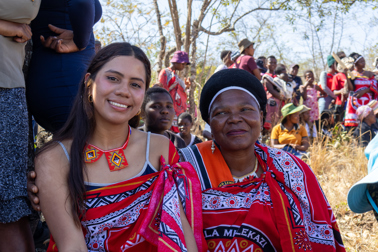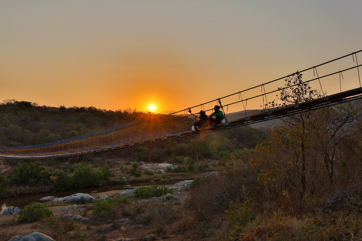View a photo gallery of the bridge building process
View a video of the bridge building process
In June, four University of Southern Indiana students from USI’s Engineers in Action (EIA) chapter, led by Dr. Susan Ely, Assistant Professor of Engineering, departed on a trip to Lubombo, Eswatini, in South Africa to build a pedestrian bridge as part of an EIA project to connect isolated communities to critical services such as shops, schools, clinics, co-ops, churches and more.
This is USI’s first year serving as the solo Lead Institution, a role that leads the EIA project in design, construction and quality control. USI previously served as a co-lead. In addition to USI, this year’s project included students from Eastern Mennonite University and the University of Iowa.
“The designing and planning of the project equates to the workload of one of the College’s engineering courses,” says Ely. “In fact, many of the students utilize their Senior Design to complete the work necessary for this project.”
USI students worked with volunteer engineers from October 2023 to April 2024 to complete the final design, which received an official Principals and Practice of Engineering (PE) seal upon completion. The bridge was the largest pedestrian footbridge ever built by USI’s chapter, spanning 106.5 meters, and took almost two months to complete. The previous bridge was in a state of disrepair after seasonal flooding. The new bridge ensures a year-round safe passage for members of the communities. Over 4,000 residents and more than 1,800 children have been impacted by the project.
“We spoke to children that hadn’t been able to go to school during the rainy season and parents who couldn’t get to work because the river was too dangerous to cross,” says Ely. “While the bridge only took eight weeks to complete, lives in these communities are forever changed because of the work that was done.”
During the eight-week project, the team worked, ate, slept and socialized with the local community, learning the language and customs of its people. Each team member played a unique and important role.

“I am deeply inspired by the ongoing opportunity to support individuals through engineering,” says Cedeno. “Seeing the excitement of a community as a new bridge connects them to vital resources and opportunities fulfills me immensely.”
Miguel Pinto ’25, electrical engineering major, served as Cultural Relations Manager, which focused on the interactions between the university teams and the local community. To help foster collaboration, Pinto assisted in organizing community soccer matches, leading students and community members in singing and dancing together and helping to introduce local community members to American foods like pancakes and banana bread. This was his third bridge build during his time at USI.
Josiah Hollis ’25, electrical engineering major, served as Construction Manager. This role included managing the construction schedule and ensuring that each day, the correct tasks were completed on time. Hollis worked with the professional masons on site, the community leaders and the student teams to make sure the correct materials and supplies were available on hand, as well as assigned the appropriate people to each task. Under Hollis’ leadership, the bridge was completed as scheduled. This was Josiah’s third bridge build during his time at USI.
Jonas Hollis ’27, manufacturing engineering major, served as Quality Manager. This role included verifying and validating all critical construction points throughout the building process. Jonas worked closely with the other members of the student teams, independently validating measurements, material quality and process steps during construction. This was Jonas’ first bridge build with USI, and he will be serving as the USI Project Manager for the upcoming 2024-25 build year.

The trip was generously funded by the USI Foundation.
Students of all majors are invited to participate in EIA and bridge project events. For more information about EIA, contact Ely at [email protected]. For more information about USI’s accredited Engineering Department, visit USI.edu/engineering. For more information about USI’s EIA chapter, visit USI.edu/eia.
Author :
Publish date : 2024-10-02 20:11:40
Copyright for syndicated content belongs to the linked Source.
The post USI Engineers in Action chapter leads construction of largest pedestrian footbridge to date in South Africa first appeared on Africa-News.
Author : africa-news
Publish date : 2024-10-02 20:48:23
Copyright for syndicated content belongs to the linked Source.